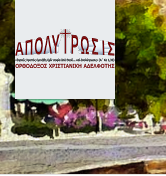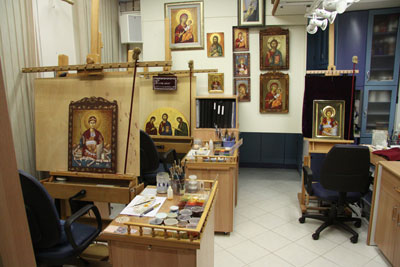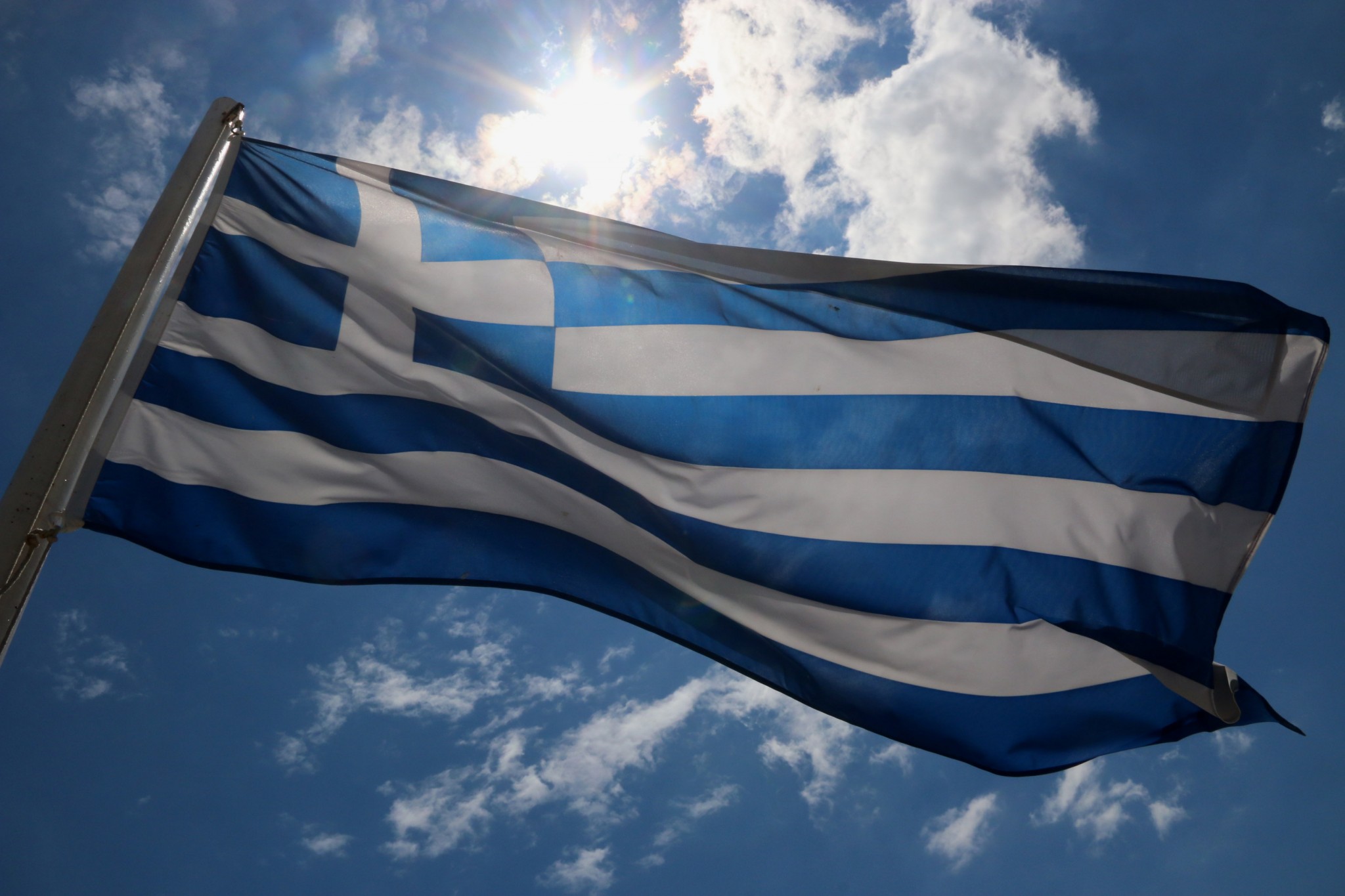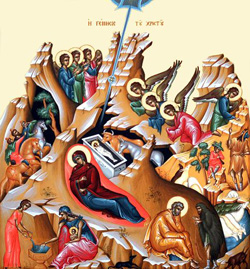 ΑΠΟΛΥΤΡΩΣΙΣ
ΧΡΙΣΤΙΑΝΙΚΗ ΟΡΘΟΔΟΞΗ ΑΔΕΛΦΟΤΗΣ
ΑΠΟΛΥΤΡΩΣΙΣ
ΧΡΙΣΤΙΑΝΙΚΗ ΟΡΘΟΔΟΞΗ ΑΔΕΛΦΟΤΗΣ
Super User
FOR A BLESSED GREAT LENT!
Translation from the article:
Στεργίου Ν. Σάκκου, Γιά μιά εὐλογημένη Μ. Σαρακοστή, περιοδ. "Ἀπολύτρωσις".
(Stergios N. Sakkos, University Professor [Read CV])
March is usually marked by the period of Lent. The Church opens before us the “stadium of virtues”. At the same time, it undertakes the role of an experienced trainer who is responsible for the athletes in the spiritual realm. Showing total respect towards our freedom, it announces the beginning of the “race”: “Enter those of you who are willing to fight!”
From the numerous spiritual “sports events”, available to us during Lent, I would like to underline two: abstinence and humility. Of course, they sound strange in our time which is dominated by self-indulgence and arrogance. Convenience, in a society of overconsumption, abolished ascetic life. The main purpose and vision in our life seems to be just enjoying ourselves. On the other hand, our selfishness abhors any sense of humility.
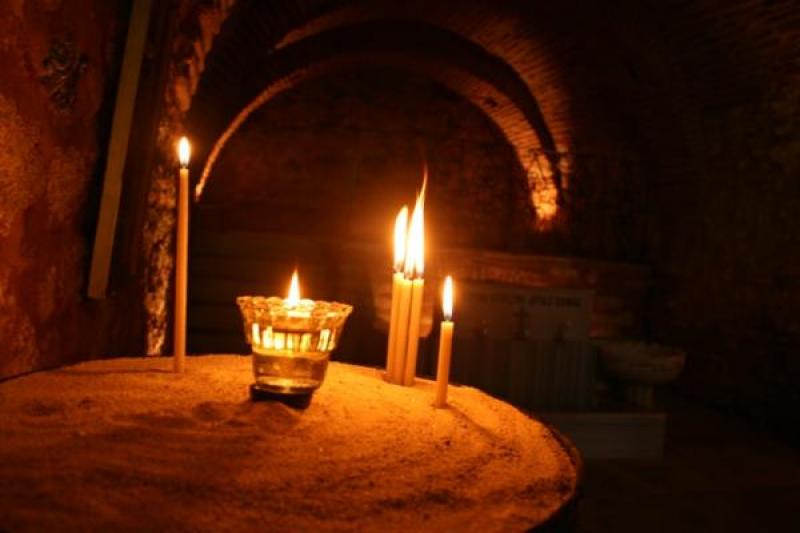 However, abstinence and humility or fasting and confession – as experienced in the Orthodox Church – are the two authentic acts of piety. Today, in our faith, everything has been simplified yet two things remain challenging: genuine fasting and sincere confession. The former has an impact on the body, not in order to exhaust or harm it but to renew it. The latter humbles the soul in order to recover its divine glory. It eradicates selfishness and arrogance which deviously dominate our life. When we participate voluntarily and with honesty in these two spiritual “events”, our life is marked by the sign of the Cross. It transforms us into authentic disciples, following the example of the crucified Lord, Jesus Christ.
However, abstinence and humility or fasting and confession – as experienced in the Orthodox Church – are the two authentic acts of piety. Today, in our faith, everything has been simplified yet two things remain challenging: genuine fasting and sincere confession. The former has an impact on the body, not in order to exhaust or harm it but to renew it. The latter humbles the soul in order to recover its divine glory. It eradicates selfishness and arrogance which deviously dominate our life. When we participate voluntarily and with honesty in these two spiritual “events”, our life is marked by the sign of the Cross. It transforms us into authentic disciples, following the example of the crucified Lord, Jesus Christ.
It is true, of course, that both abstinence and humility demand the transcension of our ego. Without doubt, the entire life of the faithful is a way of transcendence. The believer overcomes his personal will in order to obey God’s will. Without neglecting the present life, the believer transcends it to embrace “eternity”, as the Church is called.
What is impressive though, is that whoever makes eternity his priority, makes the most of the present life as well. This is because our real interest lies in what God’s law prescribes. Especially concerning fasting and confession, I could wholeheartedly recommend it as what today’s people definitely need. At the time of Saint Vasilios, medicine admitted that fasting was the foundation of a healthy lifestyle. What is more, the wisdom of our Fathers attributed human harmony to humility and sincere confession. Nowadays, these benefits are obvious from the other side, too. Heart disease, strokes and so many other diseases as a result of self-indulgence, stress, anxiety and all sorts of addictions seem like an epidemic. This is a very serious issue that forces us to admit that if we were more restrained and ascetic, if we were more honest with ourselves and God, we would be healthier both physically and mentally.
Indeed, our Church has designed a life chart for its members, so they can benefit not only in eternity but in the present life as well. Fasting and confession help people improve themselves and be purified both as individuals and as members of a social group. Fasting, abstaining from certain types of food and from vices and desires, is described by St. Chrysostom as the “mother of well-being”. It helps our body detox offering physical strength. It purifies our soul by turning our mind to God and stimulates our love, since it is connected to almsgiving/charity. “Let’s fast in order to be charitable” is the slogan of the Church. Confession helps people to make peace with themselves, restores their relationship with other people and allows them to enjoy God’s friendship and love. St. Chrysostom urges us “not to feel ashamed to confess our sins, since confession is a powerful force”.
Especially, the period of Lent becomes a guide to the paths of ascetic life and humility. During Lent the Orthodox Church suggests a series of transcendental spiritual exercises, which are similar to that of a pole used by a pole-vaulting athlete, in order to win. Will we dare such a transcendence of our ego? Certainly, this is the only way that safely leads to the resurrection.
Copyright © 2021 by Orthodox Christian Association «ΧΡΙΣΤΙΑΝΙΚΗ ΕΛΠΙΣ» ΟΡΘΟΔΟΞΗ ΑΔΕΛΦΟΤΗΤΑ. Used by permission. All rights reserved.
SONG
Α ROAD LEADING TO THE CROSS
Translation from the article:
Εὐαγγέλου Ἀλ. Δάκα, Πορεία σταυρική, περιοδ. "Ἀπολύτρωσις" 75 (2020) 68-69
(Evangelos Al. Dakas PhD in Theology and Philologist)
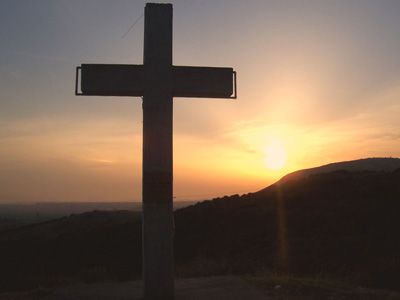 Lent is a path to crucifixion. In order to reach Holy Easter and experience the Resurrection of Christ - the most desirable dream of mankind - the faithful must first be crucified, like Him, there is no other way. If they really want to enjoy the life of the Lord, they must also participate in His death. We are not superior and more competent than our Lord. Since He walked towards His death, although He could have avoided it, it is our duty to do exactly the same (see Mt 10:24 and 1 Pet 2:21).
Lent is a path to crucifixion. In order to reach Holy Easter and experience the Resurrection of Christ - the most desirable dream of mankind - the faithful must first be crucified, like Him, there is no other way. If they really want to enjoy the life of the Lord, they must also participate in His death. We are not superior and more competent than our Lord. Since He walked towards His death, although He could have avoided it, it is our duty to do exactly the same (see Mt 10:24 and 1 Pet 2:21).
However, how does one die with Christ? How does the Cross of our Lord become an experience of the faithful?
The first way that leads us to the crucifixion and the tomb along with Christ is certainly repentance. Repentance means denying the life of the antichrist world, something I haven’t done yet, and start obeying the commandments of God. But this choice is a real cross, it is essentially a martyrdom. Two laws are fighting within me: the law of the Spirit and the law of decay. The law of the Spirit requires ascension, labour and toil, while the law of decay is easy and sweet in its taste. I choose the first, but my whole being slips into the second (Rom 7: 14-25). However, if I really want to live with God’s Son and put on His glory, I will not hesitate for a moment; no matter how much it hurts, I will kill the law of corruption and I will be dead for the world (see Ga 6:14).
The second way is prayer. In fact, the period of Lent is mainly a period of prayer, since the Church includes in its daily program numerous, long and particularly “repentant” services. Prayer means getting rid of all I want and my desires, whatever they may be, and submitting my ego to the obedience of Christ. Without a doubt, this is not pleasant for the people, because it means self-denial and quite often humiliation and pain. In specific, our prayer during Lent must repeat the Lord's prayer in Gethsemane: " Father, if you are willing, take this cup from me; yet not my will, but yours be done” (Lk 22:42), and it must have something of its mortal agony, the same sweat and blood (Lk 22:44).
The third way to participate in the mystery of Golgotha is forgiveness. Forgiveness means being able to «συν-χωρώ» that means to be in the same place with the others. That is, to offer something from the vital space of my own self to the ones who have become my enemies, to embrace them, no matter how much they have hurt me. Of course, this is not easy. It certainly presupposes a sacrificial spirit and lots of times it requires from our soul to touch Hades. Yet even this very death was first taught, in a touching way, by the crucified Jesus. The Lord on the Cross, naked, covered in blood and deep in the abyss of pain, forgave and even justified His own crucifiers. “Father, forgive them, for they do not know what they are doing.” (Lk 23:34). We, therefore, have a prototype. We are not called to this martyrdom without guarantees. Before us, God accepted it for Himself, and in fact during His most hard embitterment from His own creature.
A fourth way that leads to the Cross is fasting. Fasting aims to teach us a very basic lesson: that we will never desire the unspeakable goods of heaven, if we remain slaves to the earthly goods of this world. He who fasts becomes a disciple in the Kingdom of God, which "is not a matter of eating and drinking" (Rom 14:17). Certainly, abstinence from food is a torment, a death. And it is no coincidence that the initial fasting of the Church, the forerunner of Lent, was closely connected with the celebration of the Lord's death. When John the Baptist’s disciples asked Jesus why the Pharisees and they themselves fasted, while Jesus’ disciples did not, the Lord Himself prophesied that it is not possible for those who are feasting at the wedding table and have the groom among them, to fast. The time will come when the bridegroom will be taken from them and then they will fast (see Mt 9:14-15). And that time has come. It is the Great Lent. The bridegroom Christ was abducted and led to death, and the marriage was changed into a slaughter.
These four roads are not choices. You can’t choose only the one you like most. All believers must walk consistently on all of them. Sin has sown millions of weeds in our miserable self, that is why varied and hard work is required from the farmer. Therefore, all we have to do is put forth all our forces and get started. Our effort, graceful from the mercy of the Lord, will not take long to blossom all around. And if we fight with the same faith to the end, we will enjoy the glorious and immortal fruit of the resurrection.
Copyright © 2021 by Orthodox Christian Association «ΧΡΙΣΤΙΑΝΙΚΗ ΕΛΠΙΣ» ΟΡΘΟΔΟΞΗ ΑΔΕΛΦΟΤΗΤΑ. Used by permission. All rights reserved.
THE CHURCH IS CHRIST’S SCHOOL
Translation from the article:
Στεργίου Ν. Σάκκου, Ἡ Ἐκκλησία σχολεῖο Χριστοῦ, περιοδ. "Ἀπολύτρωσις" 63 (2008) 228-230.
(Stergios N. Sakkos, University Profssor [Read CV])
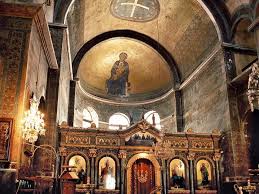 Church is God’s holy family. Its members enjoy the caring love of Father God. They are the appointed heirs of His priceless wealth. They rejoice the bond they share with their first brother, the God-Man Jesus Christ, and their fellow Christians. Church is, also, a holy army. All believers obey the law and orders of “Jesus the author and finisher of our faith” (Heb 12:2). All of them should make good use of the spiritual weapons, which are given to them, to fight bravely the spiritual God-assigned war and proceed to victory. But first of all, they must learn and experience Church as Christ’s school and then obtain the wealth of God’s family.
Church is God’s holy family. Its members enjoy the caring love of Father God. They are the appointed heirs of His priceless wealth. They rejoice the bond they share with their first brother, the God-Man Jesus Christ, and their fellow Christians. Church is, also, a holy army. All believers obey the law and orders of “Jesus the author and finisher of our faith” (Heb 12:2). All of them should make good use of the spiritual weapons, which are given to them, to fight bravely the spiritual God-assigned war and proceed to victory. But first of all, they must learn and experience Church as Christ’s school and then obtain the wealth of God’s family.
Jesus Christ walked on earth as the unique and eternal teacher (Mt 23:8). Teachers, in this world, teach the scientific truths. Science actually improves life, if is applied in a spirit of love (1 Cor 13), and as an ancient philosopher said: if it doesn’t ignore virtue. Also, science contributes to a professional development and success in an earthly career. Christ as a teacher reveals eternal truths that offer freedom, sanctification, salvation and glory and finally lead to a spiritual restoration and eternal improvement. Jesus Christ is the Teacher of truth, the unique “Professor” and the Leader who opens the way and guides people to experience this truth in everyday life.
In the school of Church the book is the Bible, the Holy Scripture: Old and New Testament. The writings of the holy Fathers enable us to have the best understanding of it. They studied and interpreted God’s words and they had a deep experience of them. Fathers were distinguished as Lord’s competent followers and enlightened guides of Christians. The wisdom of their spirit and the holiness of their life made them stand out as a strong fort where every heresy and divergence were crushed.
Lord called “disciples” His first followers. But we know that besides the twelve disciples, there was also a group of seventy men and one even wider. While leaving this world He ordered His disciples to teach people of all nations. “Go and teach all nations……” (Mt 28:19). So, one of the most common names of Christians, used in the Acts of the Apostles, is “disciples”.
Saint Paul calls the Christian faith and Church, “grace” (Rom 5:2, Tit 2:11) and considers it to be a school, God’s educational institution. He writes to his disciple Titus “For the grace of God that bringeth salvation hath appeared to all men, teaching us that, denying ungodliness and worldly lusts, we should live soberly, righteously, and godly, in this present world” (Tit 2:11-12). According to the Apostle Paul the duty of Church is to train people in the following important lessons: to stay away from any dogmatic ungodliness and from any worldly lusts. At the same time, they should live in harmony with themselves “soberly”, with other people “righteously” and with God “godly".
The believer should study the Holy Scriptures “from an early age” (2 Tim 3:14) throughout his life so that he can learn and apply these lessons as his guide. Learning is a lifelong skill. Applying this to himself, saint Ignatius in an elderly age, while heading for his martyrdom, wrote: “Now I start being Christ’s disciple” (Rom 5).
Indeed, our whole life is not long enough to study and comprehend the divine truths of His Revelation. This knowledge will be fulfilled and completed in the Triumphant Church. At that time, the Holy Spirit will reveal the whole truth. We will be able to see our Lord’s face and we will experience His knowledge, since He will turn us into those who share His glory “partakers of the divine nature” (2 Pet 1:4). However, until that moment we should thoroughly study God’s Holy Scriptures and learn about His will. This study first leads to self-knowledge and then opens the way to God-knowledge and man-knowledge. The Lord offers us the unique privilege to be “God’s students” (Is 54:13) through the Bible that is our safe guide. This kind of studying inspires prophet Habakkuk, when on his guardhouse he is trying through all his senses, to listen to God “what he will say unto me” (Hab 2:1).
God speaks to every pious soul. After His Incarnation his voice is clear. Saint Paul writes that Jesus Christ is not only “teacher and professor” but, also, becomes the content of the lesson for the Christians (Eph 4:20). This lesson, in the life of church, is offered through the Holy Scripture and through the Sacrament of the Holy Communion. The first teaches the faithful, the second sanctifies him. The Holy Scripture offers people the opportunity to prepare themselves, Holy Communion makes them perfect.
Without the Sacraments of the Orthodox Church, Christianity loses its power of salvation, because it disregards Lord’s death and Resurrection. It is reduced to just a theory, a philosophy alienated from people’s life. However, without studying and comprehending the Holy Scriptures, the faithful stays in the dark and underestimates the Sacraments to mere ritual actions. The writer of the third gospel, Luke, presents four levels for Jesus Christ’s students. These are cited below:
♦ A simple woman of the crowd, who listens to Lord’s teaching, is inspired and excited (Lk 11: 27).
♦ Lazarus’ sister, Maria “which also sat at Jesus' feet, and heard his word” (Lk 10:39) She listens to His words. She is full of zeal.
♦ Maria’s older sister, Martha. She sacrifices her personal pleasure in order to serve the Teacher and his company (Lk 10:40). This kind of learning involves sacrifice.
♦ The last one is Lord’s Mother, who is His excellent student, the one and only after Him. Virgin Mary did not simply admire and just study. She did not confine herself to a mere act of sacrifice but she offered her whole heart and soul (Lk 1:38) to bear Him “the Word was made flesh, and dwelt among us” (John 1:14).
Every Christian can place himself in one of these levels. It is obvious that if we want a Church that moves forward and fulfills its mission of salvation and redemption, it has to function as a school as well. Therefore, we should all, since we are students of this school, respond to our tasks.
Copyright © 2021 by Orthodox Christian Association «ΧΡΙΣΤΙΑΝΙΚΗ ΕΛΠΙΣ» ΟΡΘΟΔΟΞΗ ΑΔΕΛΦΟΤΗΤΑ. Used by permission. All rights reserved.
Χαλάλι της πατρίδος, μια φορά κανείς πεθαίνει!
-Σαν νυχτώσει, μην αποκοιμηθείς, έχουμε μια μεγάλη δουλειά εσύ κι εγώ. Α, μην το ξεχάσω, κι ως που να έρθω, σου έχω επάνω στο σοφρά καθαρή, μοσχοβολιστή, την καλή σου φορεσιά. Να βάλεις την καινούρια φουστανέλα σου μα και το χρυσοκέντητο γιλέκο σου, του είπε η μάνα και βάζοντας στον ντορβά ένα αγιοκέρι και λίγο λάδι, έκλεισε την πόρτα πίσω της.
Ο Χρήστος, ήταν ένα ψηλό, όμορφο, καστανόξανθο παλικάρι. Ήταν γιος του περίφημου, σ’ όλα τα περίχωρα, καπετάν-Βαγγέλη, του οπλαρχηγού. Ο καπετάν-Βαγγέλης, ήταν ατρόμητος αρματολός. Είχε οργανώσει και το δικό του λημέρι εκεί πάνω στην αετοφωλιά, του βουνό, όπως την έλεγαν. Μα πάνε χρόνια πολλά που μια μέρα στη μάχη τον χτύπησε το βόλι στο στήθος, στο μέρος της καρδιάς. Από τότε ο μικρός Χρηστάκης, είχε μόνο τη μητέρα του σ’ αυτόν τον κόσμο, την κυρά-Λενιώ.
Η κυρά-Λενιώ από τότε, εδώ και 18 χρόνια, κάθε μέρα, σούρουπο, κοντά στο απόβραδο, πηγαίνει στα μνήματα και ανάβει το καντήλι του άντρα της. Ήταν όμορφη και νέα κοπέλα όταν έμεινε έγκυος στο μικρό Χρηστάκη, πριν φύγει ο «καπετάνιος» ,όπως τον έλεγε, για το ταμπούρι του. Μα ο χαμός του, σαν να την γέρασε πρόωρα. Από τότε, τα μαύρα δεν τα έβγαλε από πάνω της, το πρόσωπό της έσπασε ,ρυτίδωσε το μέτωπό της. Μα η καρδιά της έμεινε ζωντανή, δυνατή, για να μπορέσει να μεγαλώσει το μοναχογιό της και να τον καμαρώσει ελεύθερο Έλληνα, όπως θα τον ήθελε κι εκείνος, και όχι προσκυνημένο ραγιά.
Ο Χρήστος μην ξέροντας τι και πως, περιμένοντας όπως τον ειχε πει η μητέρα του, καθόταν μπροστά στο τζάκι και βυθισμένος στις σκέψεις του ανακάτωνε τα κάρβουνα.
-Καπετάνιε μου, ήρθε η ώρα. Δε νομίζεις; Ο γιός μας, έφτασε τα 18. Το προσωπάκι του γέμισε με γένια, ίδια με τα δικά σου. Αυτό, αυτό δεν μου είπες θα είναι το σημάδι; Καπετάνιε, ήρθε η ώρα να τον καμαρώσεις από κει ψηλά, άξιο αρματολό στο ποδάρι σου. ‘Ήρθε η ώρα το σπλάχνο μας να τιμήσει τούτο το ιερό μας χώμα, που με το αίμα σου, καπετάνιε, το πότισες για να ανθίσει το νιο βλαστάρι. Συντρόφευέ τον και υποσχέσου με πως ποτέ μονάχο στο ταμπούρι και στο γιουρούσι δεν θα τον αφήσεις. Άξιο, να τον δω να ελευθερώσει την πατρίδα μας που τόσο βαριανασαίνει και άλλο δεν μπορεί να αντέξει, είπε και τρέμοντας από τους λυγμούς της, γονάτισε στον τάφο του άντρα της, έσκυψε και φίλησε το μουσκεμένο από τα δάκρυά της χώμα.
Η πόρτα έτριξε και η μαυροφορεμένη μάνα μπήκε μέσα στο σπίτι, αποφασισμένη, συλλογισμένη μα και χαρούμενη.
-Πάμε, πάμε γιέ μου. Έλα, σήκω από εκεί χάμω. Σήκω, να σε δω, να σε καμαρώσω. Έλα, έλα, ήρθε η ώρα γιέ μου, κι έπεσε στην αγκαλιά του απορημένου Χρήστου, που τώρα πιά την περνούσε ένα κεφάλι.
Με βήματα αργά και σταθερά, σαν να πηγαίνουν σε πομπή, σε ιεροτελεστία, μάνα και γιος βγήκαν στο φως του φεγγαριού. Δυο σκιές γυρτές, μην τις πάρει κανένα μάτι, μα ελεύθερες, αδούλωτες στο πνεύμα, κινούσαν για τον στάβλο τους, εκεί, λίγο παρακάτω.
Σαν έφτασαν στην πόρτα του στάβλου η κυρά-Λενιώ πήρε μια βαθιά ανάσα, και κοίταξε το γιό της γεμάτη περηφάνια. Άναψε την γκαζόλαμπα που έστεκε κρεμασμένη στον τοίχο. Είπε το Χρήστο και πήραν από ένα δικράνι και άρχισαν να μετακινούν τον μεγάλο σορό με τ’ άχυρα από τη γωνία του στάβλου, παραδίπλα.
- Μάνα, γιατί ήρθαμε εδώ τέτοια ώρα; Γιατί μεταφέρουμε τα άχυρα αφού τόσα χρόνια εδώ τα έχουμε και από εδώ παίρνουμε για να ταΐσουμε τα ζώα; Γιατί είσαι βουρκωμένη; Μήπως έγινε τίποτε στα μνήματα; Γιατί δε με άφησες να έρθω μαζί σου; Τούρκοι ήταν; Πες μου, είπε και θέριεψε το παλικάρι και μόνο στην ιδέα.
- Όχι, όχι παιδί μου, ησύχασε τίποτε από όλα αυτά. Θα σου εξηγήσω, θα σου πω και θα καταλάβεις και μάλιστα πολύ σύντομα. Μόνο φέρε μου τη σκούπα να συγυρίσω το πάτωμα και σύρε να αμπαρώσεις καλά την πόρτα, από μέσα, μην τύχει κάνα κακό.
Η κυρά-Λενιώ με ακράτητα δάκρυα στα μάτια, άρχισε να σκουπίζει το πάτωμα. Τότε, φάνηκαν καθαρά τα σανίδια του.
- Γονάτισε γιέ μου, γονάτισε κι έχω να σου πω μια ιστορία.
Αφού του ξαναμίλησε, όπως σχεδόν κάθε βράδυ, για τη θωριά την ανδρεία, το θάρρος αλλά και τον θάνατο του πατέρα του έσκυψε στο πάτωμα. Μέτρησε από τη γωνία του τοίχου δέκα σανίδια και ψηλάφησε με τα λεπτά της δάχτυλα τους αρμούς τους. Εκεί, κάπου ανάμεσα στο δέκατο και στο εντέκατο σανίδι, το δάχτυλό της, σαν να έπεσε σε ένα βαθούλωμα. Τότε, μπροστά στα μάτια του έκπληκτου Χρήστου, άνοιξε μια μικρή καταπακτή.
- Εδώ, εδώ γιέ μου, μου είχε αφήσει παραγγελιά ο καπετάν-Βαγγέλης, ο πατέρας σου, να κρύψω τ’ άρματά του... Μου είπε πως όταν δεις τον γιο μας, Λενιώ μου, να έχει γεμάτο το πρόσωπό του με γένια, τότε, τότε θα του αποκαλύψεις το μυστικό μας και τότε, με την ευχή μου και τη δική σου, να τον στείλεις στο ταμπούρι μου, να πάρει τη θέση μου, αυτήν που άφησα κενή και…ξεψύχησε, είπε και πλαντάζοντας στο κλάμα, αγκάλιασε το αγόρι της που κατάματα την κοιτούσε με δέος.
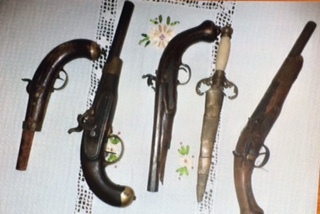 Αμέσως, έβγαλε από την καταπακτή το καριοφίλι, την κουμπούρα και το σπαθί του ξακουστού, αθάνατου αρματολού καπετάν-Βαγγέλη, που είχε δώσει στην Τουρκιά, καλά, να καταλάβει, πως ο Έλληνας, σαν του βεβηλώσουν τα ιδανικά γίνεται θεριό.
Αμέσως, έβγαλε από την καταπακτή το καριοφίλι, την κουμπούρα και το σπαθί του ξακουστού, αθάνατου αρματολού καπετάν-Βαγγέλη, που είχε δώσει στην Τουρκιά, καλά, να καταλάβει, πως ο Έλληνας, σαν του βεβηλώσουν τα ιδανικά γίνεται θεριό.
- Γιέ μου, παλικάρι μου, ήρθε λοιπόν η ώρα. Ήρθε η ώρα να τιμήσεις τον νεκρό πατέρα σου, να πολεμήσεις δίπλα στο φλάμπουρο που αγέρωχα κυματίζει, μόνο, κει ψηλά στο λημέρι. Ήρθε η ώρα, τούτα τ’ άρματα, που ο πατέρας σου, σου τα άφησε κληρονομιά, να ξαναπάρουν φωτιά ώστε να λευθερώσεις τον πονεμένο τόπο μας. ‘Ήρθε η ώρα του ξεσηκωμού, γιέ μου. Με την ευχή μου και με την ευχή τη δική του, έλεγε σκουπίζοντας ξανά και ξανά τα μάτια της.
-Να, πάρε κι αυτό, συνέχισε. Είναι το εικόνισμα της Παναγιάς μας. Είναι του πατέρα σου. Το είχε πάντα στο ζωνάρι του από τότε που χωριστήκαμε και κίνησε για το βουνό. Μα, και σε κάθε μάχη πάντα στην μέση του το είχε να τον σκεπάζει και να τον φυλάει η Παναγιά μας η Γοργοϋπηκοος
Σήκωσε τότε το βλέμμα της και κοίταξε ίσια, στα μάτια τον μονάκριβό γιο της. Έτσι, δεν τον είχε ματαδεί. Το στήθος του είχε φουσκώσει από περηφάνια και τιμή. Οι φλέβες του τινάζονταν πότε, πότε σαν να μην μπορούσαν να βαστάξουν το αίμα που κυλούσε μέσα τους. Τα μάτια του… τα μάτια του γυάλισαν σπινθηροβόλα μέσα στο λυκόφως της γκαζόλαμπας, σαν αντίκρυσαν το βλέμμα της, ηρωϊδας, μάνας…δεν άντεξαν ένα δάκρυ ατίθασο, που τόση ώρα αγωνιζόταν να το καταπιεί, ξεπήδησε στα αναψοκοκκινισμένα ,από το πάθος για τη λευτεριά, μάγουλά του.
-Και ποτέ, ποτέ σου μην ξεχάσεις… ποτέ σου μην κιοτέψεις, μην λιγοψυχήσεις. Μάχου υπέρ πίστεως και πατρίδος, γιέ μου. Κι εγώ θα είμαι μαζί σου, με τις προσευχές μου. Ο Κύριός μας, θα σε φυλάει και η Παναγιά μας, θα σε σκεπάζει μέσα στην αντάρα της μάχης. Μαζί σου ακόμα φύλακας άγγελος θα είναι ο πατέρας σου ,βοηθός και προστάτης σε κάθε δυσκολία. Για του Χριστού την πίστη την αγία και της πατρίδος την ελευθερία, παιδί μου. Γιατί, χαλάλι της πατρίδος, μια φορά κανείς πεθαίνει, είπε κι ένας ήχος ,σαν από αγριοπούλι, ήρθε να τους αναστατώσει, να τους σηκώσει.
Ήταν το συνθηματικό. Είχε έρθει και η ορισμένη ώρα να κινήσουν για το βουνό, όπου θα περίμενε ένα από τα παλικάρια να πάρει τον Χρήστο, και σαν αετοί να πετάξουν εκεί, πάνω στην αετοφωλιά. Εκεί που πόδι Τούρκου δεν μπόρεσε να ανέβει. Εκεί για να αναπνεύσουν και να χαρούν τον αγνό αέρα της ελεύθερης πατρίδος, της Ελλάδας.
Π.Τ.
μαθητής Γ΄Λυκείου
Γιά τίς παραγγελίες
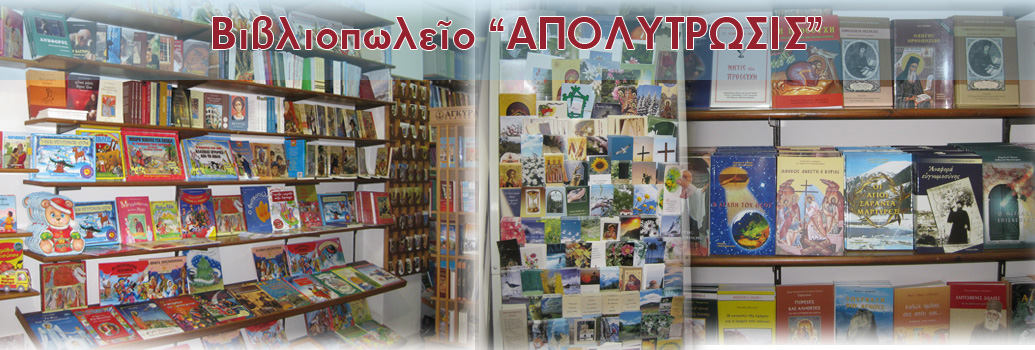 Γιά τίς παραγγελίες βιβλίων, CDs, DVDs
Γιά τίς παραγγελίες βιβλίων, CDs, DVDs
ἀπευθύνεσθε στό Βιβλιοπωλεῖο μας «Ἀπολύτρωσις» (τηλ. 2310 274518)
ἤ μπεῖτε στό Ἠλεκτρονικό Βιβλιοπωλεῖο μας.
GAME 3
Lucky you! Chocolate for you!
 Equipment:
Equipment:
a dice,
a large bar of chocolate,
a napkin and plastic gloves for each player.
Preparation:
Put the chocolate on a small table.
Players sit in a circle at some distance around the table, each one with the napkin and the gloves.
Playing:
Each player takes turns to throw the dice.
When someone throws a three or a six, they run to the table and start eating the chocolate, one square at a time, with the napkin around their necks and their hands in the gloves.
Meanwhile, the others carry on rolling the dice. The next person to throw a three or a six runs to the table and taps the other person on the shoulder who must stop eating as they have been replaced. The next one starts eating the chocolate and so on.
GAME 2
Pot Shots
 Equipment: Ten yoghurt pots and one table tennis ball are required.
Equipment: Ten yoghurt pots and one table tennis ball are required.
Preparation: Build a yogurt pot pyramid, by placing four pots on the table and placing three on top of them, then two on top of those and then one.
Playing: Each player (or team) is given a table tennis ball and throws it in turn at the pyramid from an agreed distance. The aim is to knock down all the pots or as many pots as possible.
Winning: This game can be played just for fun; otherwise score one point for each pot knocked off the pyramid. The team or player with the highest score wins.
GAME 1
One chair for each player
 We arrange the chairs in a circle in the middle of the room.
We arrange the chairs in a circle in the middle of the room.
One player volunteers to stand in the centre of the circle because there is no spare chair for them.
As soon as someone says ‘now’ you move trying to find another place available to sit.
Please try to do this fairly and not by pushing or shoving somebody else out of their seat.
When the player in the middle manages to sit on a chair, their place in the middle of the circle is taken by another one.
This game is fun to play but there is no winner.
THE PARABLE OF THE GOOD SAMARITAN
Translation from the Book
Ὁ Θεός στήν Καινή Διαθήκη, Βοήθημα Κατωτέρου Κατηχητικοῦ Β΄,
ἐκδ. «Χριστιανική Ἐλπίς» Ὀρθόδοξη Ἀδελφότητα, Θεσσαλονίκη 2015, σσ. 61-66
The parable of the Good Samaritan
Lk 10:30-37
Have you ever heard of climbers? Climbers love to climb high mountains and conquering the highest of them! It must be very tiring to climb these mountains, however, the view they can enjoy at the top of them is very rewarding!
Maybe some of you are dreaming to become climbers when you grow up. You can, though, climb on the highest mountain and reach the top of it NOW! You‘ll have to work a lot on it and surely it won’t be easy, but the joy you‘ll feel in the end, can be priceless!
Can you guess what is this high mountain and the peak of it, that we ’re talking about?
And what is the path we need to follow, so we can climb this mountain? We ‘ll be able to find it out today, by listening to the parable of the Good Samaritan that Jesus told us.
A man was travelling from Jerusalem to Jericho. There was only one way connecting these two towns. The distance between them was quite long. And the road was not always busy, as it was quite rough and dangerous to walk on. Sometimes, bandits preferred to hide there and ambush the passengers. This man had the bad luck to get ambushed while walking. He tried to resist the robbers, but they beat him up very hard and left him half–dead along the road!
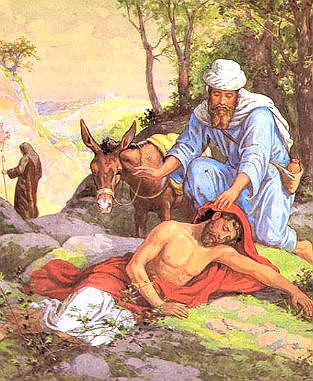 The poor man was in such pain! He suffered so much and was so upset for what the robbers had done to him. And at that very moment, he felt so hopeless, that almost gave up on his life. He thought “I ‘ll probably die here, all alone in this desert!”.
The poor man was in such pain! He suffered so much and was so upset for what the robbers had done to him. And at that very moment, he felt so hopeless, that almost gave up on his life. He thought “I ‘ll probably die here, all alone in this desert!”.
It was not long after that a priest came along. He was probably going home after the service he had in Jerusalem. He soon realised there was a wounded man on the ground. What would we expect him to do in such a case? To stop and help the robbed man, right? However, he went to the other side of the road so to avoid him and quickly went on his journey.
Soon, a second person, a Levite (a priest’s assistant and Temple worker) came by. He came nearer, saw the injured man and thought “He must have been ambushed… That means I am in danger to be attacked by the robbers, too!”. So, the Levite kept on going without helping the man.
The pain became greater for the injured man. Not only he was hurting in his body, but also his heart was broken by the bad behaviour of the first two passengers. They just left him there to die. He lost all his hopes. He was sure no more people would pass by the road. And probably even if they did, they would not care for him enough to stop and save him. He thought “I’ll die here alone”.
A third man appeared walking on the road. He was a Samaritan. Jewish people did not really like people from Samaria. To the point that they refused to even talk to them! But when the Samaritan saw the injured man, he felt very sorry for the beat-up Jewish man! Love moved him towards the man and immediately decided to help him! He selflessly tried to aid the injured man with the oil and wine he was carrying with him. He took care of his wounds, treating them with oil to soften the pain and with wine to disinfect them (as they used to do back then). The Samaritan ripped his clothes to make bandages to cover the wounds. And after that, he lifted the man and sat him on his own animal, and he walked beside them. Soon they arrived at a small inn. The Samaritan stayed up all night looking after the wounded man. The next day before leaving, he paid the innkeeper in advance with two denarii enough for some more days. He asked from him to make sure that the injured man will be taken care of. “I’ll be back after a couple of days to pay you, should the man need something extra.”
The characteristics of true love
Such a moving story! Isn’t it? We can find the attributes of true and pure love in the Good Samaritan’s behaviour. Genuine love can lift us to heaven. It is like a staircase we can climb and reach the sky! There are five steps to take. Count them in your five fingers and make sure you learn them by heart:
a) Love towards everyone. The Samaritan showed love to the Jew, even if he was an enemy to him. Love is not selective. And we need to learn to love all the people the same!
b) Love through actions. The Samaritan didn’t only think about helping the injured man, but he put his thinking into practise. He didn’t just say to him “Bless you! You need help!”, but he took good care of him. He tried to minimize his pain and then carried him to an inn. He even paid more the innkeeper to specially look after him. We show love through our actions. It’s not just words. Being nice to someone, running an errand for someone or visiting somebody when they’re ill, surely are actions of love. (We ask the children to suggest ideas of love actions). So, love is helping my classmates with their homework, visiting someone when they’re in hospital or maybe they’re just lonely at home. Love is lending stuff to people they need them, helping our parents with the chores. Love is to be happy with the others’ success. There are so many ways to show our love!
c) Selfless love. Did the Samaritan ask for something back when he helped the Jew? Of course not! He was expecting nothing. When we do something out of love, we shouldn’t expect anything in return. Selfless love doesn’t work like that!
d) Secret love. Did the Samaritan help the injured man, so other people would see this and admire him? No. He hid well the good deed he did. This means that whatever good we may do to someone should stay secret, between us and them. All our good deeds are recorded in the book of our life. God sees and knows about them and that’s more than enough. He will award us.
e) Love with sacrifices. If we think of love being a staircase, the very last step and at the top of it, is sacrifice! What sacrifices the Good Samaritan did? He sacrificed his time, his money… He even put his life in danger! Loving one’s neighbor was risky and economically costly in this story. What about us? You think we can sacrifice something for others? Our time, some of our playtime, some of our pocket money maybe? When we are willing to give something that is ours or share it, people can feel our kindness. Would you, like to show our love to others? (Charity actions suggestions, i.e., visit to a hospital or a charity home, contributing into a petty cash, collecting food for a poor family. It would be an extraordinary experience for the children to try participating in any of those good deeds).
Love is a ladder that can lead us to heaven! Also, heaven can come down to us through it! If we show our love to other people with our actions, selflessly and in secret, then we create a small Heaven on earth! We make people around us happy and that subsequently creates happiness in our souls, too!
Copyright © 2021 by Orthodox Christian Association «ΧΡΙΣΤΙΑΝΙΚΗ ΕΛΠΙΣ» ΟΡΘΟΔΟΞΗ ΑΔΕΛΦΟΤΗΤΑ. All rights reserved.
